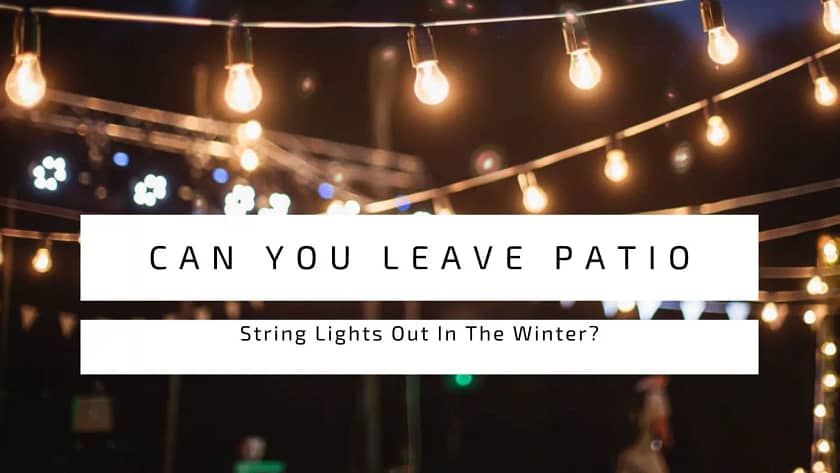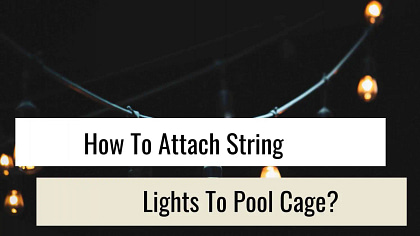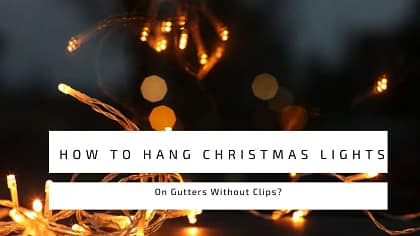String lights are a great way to add extra ambiance to your outdoor space. Whether you’re entertaining, relaxing on the porch, or just looking for some additional outdoor lights, strings are the way to go.
You can hang them on trees or bushes, strung along the edges of your yard, or placed around your porch. However, can string lights survive the winter?
Yes, patio string lights are fine over the winter. For snowy temperatures, use IP65 or above since they are better suited for these conditions. Apart from this, the wires of the strings can freeze, and the snow can weigh down the strings.
What are an IP Rating And Its Importance to String or Patio lights?
Homeowners can quickly identify the level of protection that a device has against liquids and dust.
The first digit (or suffix) in an IP rating shows protection against solid objects, while the second one indicates protection against liquids. The third digit (or suffix) offers protection against mechanical damage.
Patio string lights have an IP65 rating, so they are dust and water-proof. IP65 is one of the highest ratings. Thus, they can withstand the winter, and moisture will not penetrate the bulbs.
When purchasing patio lights, look at the Ip rating because if there aren’t any, then you should not use them outdoors.
Should You Take Down Patio String Lights During The Winter?
Patio string lights are mainly for adding a bit of ambient lighting or for decorative purposes. If that’s the case, then you should take your lights down during the winter. Furthermore, winter can bring snow storms that can send you string lights flying in the wind.
Here are storage tips for your lights.
Before storing patio lights, make sure they are clean and dry. Then, wrap them in bubble wrap or a blanket to protect the bulbs from breaking or cracking.
Some people keep their patio lights inside their garage because they can easily find them during the spring, summer, and fall seasons. A garage provides an extra layer of protection against moisture and dust accumulation that can damage your patio lights.
Another tip is to hang your lights, so they are not exposed to the snow. Instead, please place them in areas where water, snow, or even sunlight can enter them. Even though your lights are IP rated, protecting them from the element increases their lifespan.
Therefore, string them under gazebos and pergolas.
Other Considerations
We discussed the importance of protecting your patio lights above, but you must ensure that its components are protected from the snow.
Make sure the extension cord is rated for outdoor use. Snow is water, and many extension cords can not withstand moisture. Hence, the best way to do this is by using an outdoor-rated extension cord.
Regular string lights are not suited for outdoor use, so they can not withstand the elements. If moisture gets into their wires, it can damage the lights and, even worse, cause a fire. The same goes for any extension cords.
Additionally, choose LEDs instead of traditional bulbs. They are more durable and can handle the buildup of snow.

Choose GFCI Lights And Outlets
With outdoor lighting, safety is a key consideration. Outdoor lights must be protected from weather damage and be grounded in case of an electrical short.
Fortunately, there are several outdoor light fixtures with built-in protection against electrical shorts.
Outdoor lighting that is GFCI protected includes exterior landscape lights and outlets. These lights have a special circuit breaker that shuts down the circuit if it detects short or other dangerous conditions.
This protects both the wiring and any people who might come into contact with the fixture’s electrical system. It also decreases house fires and electrocutions.
It is a good idea to install separate circuit boxes for each extension cord and outdoor light. If there is an electrical issue with one box, it will not cause other problems.
If you want to connect more than one cord, it is best to use a waterproof socket box.
Protect Your Outdoor Lights
Although LED bulbs work well in cold temperatures, the wires that power them may not.
If ice forms on the shielding and it breaks or cracks, you’re no longer protected from moisture. Sealing it with silicone liquid waterproof can help, but there is a high risk of moisture re-entering the bulb.
I suggest replacing crack bulbs and inspecting your LEDs for any damage. Again, the best way to protect your lights is to store them indoors during the winter.
You can cover them with Tarp, but it does not protect them from freezing temperatures.
To Sum
Patio string lights with IP65 or higher can withstand winter conditions. But, snow storms can damage them. It is best to store them away to prevent the bulbs from cracking.




